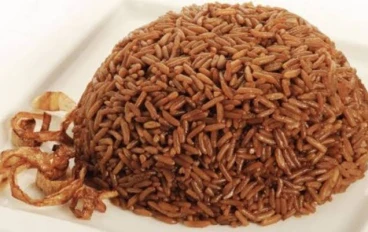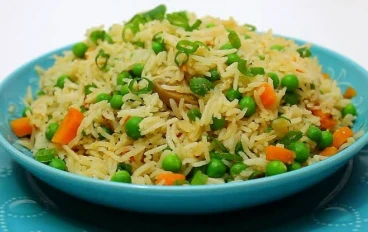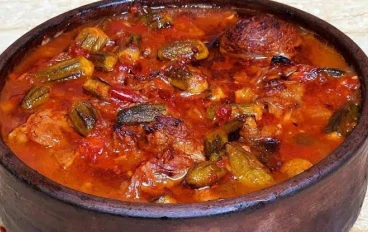
Exploring Egyptian Culinary Heritage: Beyond Flavors to Culture and Heritage
Have you ever wondered about the origins of the food we eat every day? In this article, we will take a quick tour of world cuisines to explore different cooking cultures and learn about the famous traditional foods that reflect the history and traditions of each country. We will start our journey in the Middle East. Let's begin our exploration of Egyptian cuisine, which is one of the oldest cuisines in the world and is known for its diversity and richness in unique flavors and ingredients.
Introduction to Egyptian Cuisine:
Egyptian cuisine is one of the oldest in the world, characterized by its rich diversity and ancient history that reflects the various civilizations that passed through Egypt over the ages. Egyptian cuisine is a diverse blend of rich natural ingredients and unique spices, giving its dishes rich and distinctive flavors.
Egyptian cuisine is known for its simplicity and richness at the same time, relying on making the most of readily available ingredients such as rice, vegetables, meats, fish, and fruits. Egyptian cuisine also stands out for its distinctive use of spices and herbs, adding a unique touch to the dishes.
In addition to its culinary diversity, Egyptian cuisine also reflects the cultural and social traditions of the Egyptian people. Food in Egypt is not just a means of nutrition but also a way of communication and solidarity among individuals, families, and communities.
Through this article, we will explore the depth and beauty of Egyptian cuisine, and learn about the importance of its culinary heritage and its impact on Egyptian and global
culture.
The History of Egyptian Cuisine:
The history of Egyptian cuisine dates back thousands of years, as Egypt has been the cradle of ancient civilizations such as the Pharaohs, Byzantines, Romans, Arabs, and Ottomans. Egyptian cuisine has been influenced by these diverse civilizations, making it rich and diverse.
Egyptian cuisine is characterized by the diversity of its ingredients and spices, as the fertile land and strategic location of Egypt throughout the ages contributed to the availability of a variety of foodstuffs. Egypt was a source of grains such as wheat, barley, and oats, and the Nile waters were a major source of fish and other aquatic crops.
Over the centuries, cooking techniques in Egyptian cuisine have evolved to include a variety of dishes, ranging from grilled, fried, and cooked foods to delicious desserts. Some famous Egyptian dishes include Kushari, Molokhia, Ful, and Ta'ameya, which reflect the diversity and richness of Egyptian cuisine.
Additionally, Egypt has been a center of global trade throughout history, leading to the exchange of cultures and cuisines with other peoples, which has influenced the diversity of Egyptian cuisine and enriched it with new ingredients and unique flavors.
Egyptian cuisine is an important part of the country's cultural heritage, reflecting its rich history and cultural diversity, and remains a source of pride and joy for Egyptians and lovers of Egyptian cuisine worldwide.
The Main Ingredients in Egyptian Cuisine:
The main ingredients in Egyptian cuisine include a variety of food items that reflect the diversity and richness of the country's culinary heritage. Among these ingredients:
1. Rice: Rice is a staple in the Egyptian diet and is used in preparing many famous dishes such as Kabsa, Kushari, and Mahshi.
2. Vegetables: Vegetables like tomatoes, potatoes, eggplants, green peppers, onions, and garlic are used in preparing main dishes, appetizers, and salads.
3. Meat: Various types of meat such as beef, lamb, chicken, and duck are used in Egyptian cuisine. Meats are prepared in different ways including grilling, frying, and stewing.
4. Beans and Lentils: Beans and lentils are important sources of protein in Egyptian cuisine and are used in preparing dishes like Ful Medames and lentil soups.
5. Spices and Herbs: Egyptian dishes are known for their unique spices that give a special flavor to the dishes. Common spices include cumin, coriander, thyme, and other Eastern spices.
By using these main ingredients, along with their diversity and availability, a variety of delicious and flavorful dishes are prepared in Egyptian cuisine.
Cooking Techniques in Egyptian Cuisine:
Cooking techniques in Egyptian cuisine are diverse and reflect a rich and varied culinary heritage. Among the common cooking techniques in Egyptian cuisine are:
1. Frying: Frying is widely used in Egyptian cuisine to prepare many favorite dishes such as falafel, samosas, and kibbeh. Ingredients are dipped in hot oil until they become golden and crispy.
2. Grilling and Barbecuing: Grilling processes are essential in Egyptian cuisine, where meats, poultry, and fish are prepared over charcoal or under a grill, giving them a unique and rich flavor.
3. Slow Cooking: Low heat cooking is used in Egyptian cuisine to prepare traditional dishes such as stews and casseroles. This cooking method allows for deep flavors and even distribution of heat.
4. Steaming: Steaming techniques are used in Egyptian cuisine to prepare dishes like kushari and stuffed vegetables. Ingredients are cooked together in a closed container with added liquids, helping to retain flavors and nutrients.
5. Baking: The oven is used in Egyptian cuisine to prepare many dishes such as casseroles, pasta, and desserts like baklava. Ingredients are baked in the oven at specific temperatures to achieve the perfect cooking and texture.
By using these diverse techniques, delicious and distinctive dishes are prepared, distinguishing Egyptian cuisine and making it an integral part of the country's culinary heritage.
Some of the most famous dishes in Egyptian cuisine include:
1. Koshari: A dish made of rice and lentils cooked together and topped with fried onions. Koshari is a beloved popular meal in Egypt and is consumed on various social occasions.
2. Molokhia: One of the main dishes in Egyptian cuisine, made by cooking green vegetables with meat in a richly spiced broth.
3. Foul Medames: Foul Medames is a traditional Egyptian dish consisting of mashed fava beans with tahini, garlic, lemon, and spices. It is usually served with a piece of toasted bread.
4. Ful Medames: Ful Medames is a common breakfast dish in Egypt, where fava beans are cooked with garlic and tahini and served with boiled eggs and bread.
5. Kebabs and Kofta: Egypt is known for offering a variety of grilled kebabs and kofta, which are characterized by their unique flavor and often served with side dishes like rice and salads.
6. Hawawshi: It consists of grilled meat slices wrapped inside pita bread and stuffed with vegetables and spices, making it a delicious and popular fast food in Egypt.
These famous dishes are an integral part of Egyptian cuisine, embodying its diversity and rich culinary heritage.
Desserts and Beverages in Egyptian Cuisine:
In Egyptian cuisine, desserts and beverages are an integral part of the overall culinary experience. Egyptian desserts are known for their variety and delicious taste, reflecting a long history of traditions and culture. Among the famous desserts in Egyptian cuisine:
1. Basbousa: A traditional Egyptian dessert made from layers of semolina soaked in sugar and butter, baked in the oven until golden, and then soaked in hot sugar syrup.
2. Konafa: Konafa is a popular dessert in Egyptian cuisine, consisting of shredded pastry filled with cheese, baked in the oven, and soaked in sugar syrup.
3. Natural juices: Egypt is famous for offering a wide range of refreshing natural juices such as strawberry, mango, grape, orange, and apple juice.
4. Egyptian coffee: Coffee is an integral part of Egyptian hospitality traditions, often served after meals as a welcoming gesture to guests. Egyptian coffee is typically strong in flavor and sweetened with sugar.
5. Egyptian tea: Tea is a common beverage in Egyptian cuisine, usually served with breakfast or after meals as a refreshing drink.
These desserts and beverages add a special touch to the culinary experience in Egyptian cuisine and are considered an essential part of the cultural and social traditions in Egypt.
Egyptian Traditions and Celebrations Associated with Food:
Egyptian traditions and celebrations associated with food are an integral part of daily life and the rich Egyptian culture. Here's an overview of some of these traditions and celebrations:
1. Iftar during Ramadan: Ramadan is an important month in Egyptian culture, characterized by hospitality and social interaction among family, friends, and neighbors. Iftar, the breaking of the fast during Ramadan, is an occasion for gathering and expressing solidarity and social cohesion. Carefully prepared meals are served in lavish feasts, including a variety of delicious foods and refreshing beverages.
2. Religious Holidays and Festivities: Religious holidays and festivities in Egypt witness large family gatherings, where food plays a significant role in the celebrations. A wide range of traditional dishes is served during these occasions, reflecting the country's culinary and cultural heritage.
3. National Holidays: National holidays in Egypt feature grand celebrations with traditional foods and beverages. Street parades and public festivals are organized, offering delectable foods while people exchange greetings and well-wishes.
4. Weddings and Social Events: Social occasions such as weddings and engagement parties are significant events in the lives of individuals in Egypt. Food is an essential part of these gatherings, with delicious dishes and sweets served to guests as a welcoming gesture and an expression of joy and happiness.
These Egyptian traditions and celebrations associated with food reflect the diversity of the country's culture and heritage, emphasizing the importance of food as a means of communication and the enhancement of social and familial bonds.
Conclusion:
In conclusion, the Egyptian cuisine is not just a collection of foods and recipes; it is an integral part of the rich Egyptian identity and culture. It is characterized by its diversity and richness in ingredients and flavors, making it one of the most renowned and distinctive cuisines in the world. From simple popular dishes to elaborate meals served at special occasions, the Egyptian cuisine reflects a deep history, a rich heritage, and the spirit of hospitality and social cohesion. If you're seeking a culinary experience rich in flavors and tradition, the Egyptian cuisine offers you a unique and memorable journey in the world of cooking.








































